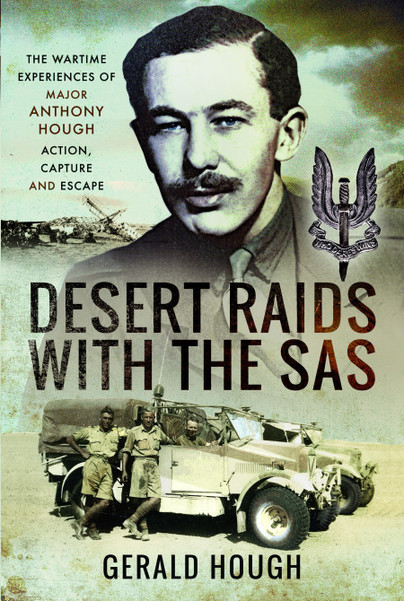Author Guest Post: Gerald Hough
This is a story that carries at its heart the bravery of our British and Commonwealth troops who battled against the Axis powers in World War 2. Whilst it is the story of one man’s journey it is a journey shared by many. Some reached their destination, others didn’t. All were courageous.
At my father’s golf club there were many decorated war veterans, one with a VC. Post war the clubhouse was an intact wing of a burnt-out stately home and the mens bar was a grand room with a very high ceiling and a pipe running around the wall about ten feet off the floor. I am not sure what it was there for, but it was well secured, as it had to be. Above it, facing the practice green was a small sash window that the club steward would open with a long pole when asked to do so by the Captain. Too high to see through but a useful target to hit balls through onto the green after a rowdy club dinner. Needless to say, the glass needed constant repair. The men of the war enjoyed hanging off the pipe and circumnavigating the bar and this was quite a trial of strength given the distance. Such was the comradery and enjoyment of life after the rigours of war. Driving home was never considered a problem.
It took me some time to work out my father. He never gave much away and whilst pleasant rarely took much interest in his family, preferring golf which he was very good at playing. I often wondered why he was so distant and now understand the impact the war had on his character. I discovered he joined 21 SAS in 1950, in the ranks, and remained for over two years. What he got up to is a mystery and why he did so an enigma. At that time, he had had two children, Tessa my older sister who died a few months after birth and Tony my elder brother. My mother became pregnant with me in August 1951. I think I understand why he joined. He needed the company of men who had gone through what he had gone through. He was facing an emotional breakdown and needed to find a way through.
Our generation and the ones that follow us have not been thrust into war and how lucky we are. The brutal savagery of conflict is terrible. There is nothing glamorous about it and those that survive never lose connection with those that do not. Over the years he told me a fair amount about it but never about the tormented soul he carried inside him. In this book I have tried to escape the gung-ho accounts of the past, where death and destruction was brushed aside, and have written about the awfulness of it all. About the infinitesimal distance between life and death or serious injury. Those that survived were brave and courageous. Those that died were equally so.
Before the war he had skied in Switzerland and by all accounts was very accomplished. He joined a hastily formed battalion in January 1940, whose aim was to train in snow warfare and travel to Finland to help in the campaign against Russia. Here he met some of the great names of the war and away to Chamonix they went to train with the Chasseurs Alpins. It all folded up before deployment, after the Finns agreed an Armistice with Russia in March of that year.

The 9th Battalion was a reserve battalion, initially called the 1st Battalion Tower Hamlets Rifles. The Allies had enjoyed considerable success in North Africa under Wavell, defeating the Italian 10th Army and capturing 140,000 Italian troops. The 9th Battalion arrived toward the end of this campaign and took no part in it. Hitler sent Rommel with the Africa Corps to save the day and given the success of German forces in Europe in 1940 the correct assumption was that things were going to get more challenging. The 9th was one of the first battalions to face Rommel and it was the first time it had been in combat. It was decimated in a fighting retreat all the way to Tobruk.

Later he joined 1 SAS, as did a number of others from the Rifle Brigade, as they were ideally suited to this type of warfare. He was unlucky in that their mission was a one-way trip right from the start. Capture or death was inevitable and only a few made it back. He was captured and sent to Italy in a submarine. He escaped from the POW camp later that year but decided not to head south immediately, rather lay up for a while and await the 8th Army, which was pushing up from the south at great speed. He got unlucky again as General Kesselring established the Gustav Line across Italy which extended to a few miles south of where he was hiding, making escape very hazardous. Finally, he did break out, crossing snow laden mountains to reach Allied lines in the bitterly cold winter of 1943. For this he was Mentioned in Despatches.
During his escape he was sheltered by families in a village in the Majella Mountains called Pretoro. These brave people risked all to protect British escapees; and were themselves to suffer severe deprivation. I went to visit in 2017 and met with the two surviving children of a family that had looked after him and who remembered my father. They were overjoyed to hear he had managed to escape as they thought he had died in the freezing cold of the mountains. These villagers are tough mountain people who have had hard lives and the village sits at 800 meters, just within the Majella National Park. It is a beautiful place and one that is rarely visited by British people. I went back in 2019 and spent much more time there, exploring routes across the mountains, walking alongside vertical drops into deep gorges, rooting around in large caves that showed clear evidence of past occupation and toiling up and down steep tracks through dense forest.

This has been an incredible journey and I hope that you will agree with me that the book sweeps you along a tumultuous ride through a time where all was at stake and people gave all of themselves to defy tyranny.

………………………………………………………………………………………….

Desert Raids with the SAS is available to preorder here.

